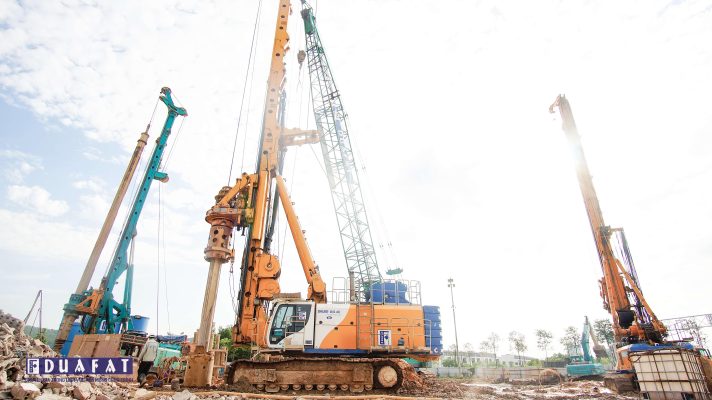Bored pile drilling is a crucial phase in the foundation construction of large-scale projects. Ensuring the quality and efficiency of this process requires careful consideration and control of various influencing factors. Below are the factors that impact both the process and cost of bored pile drilling.
Geology
The geological conditions at the construction site are the most critical factors in determining the drilling process of bored piles. Different soil and rock layers affect the drilling speed, the ability to prevent borehole collapse, and the continuity of the pile. Complex geology, such as weak soil layers, sand, gravel, or hard rock, can create challenges for the drilling process and require appropriate handling methods.
The cost of bored pile drilling is also significantly influenced by this factor. Geology determines the complexity and technical requirements of the drilling process. Soft and easy-to-drill soil results in lower construction costs, while harder terrain with rock formations requires specialized drilling equipment, leading to higher costs.

Equipment and Construction Technology
The selection of drilling equipment and construction technology appropriate for the geological conditions and technical requirements of the project is crucial. Modern bored pile drilling machines can adjust drilling speed, thrust force, and drilling depth according to actual needs, optimizing construction efficiency. Construction technology also involves the use of drilling fluid, cement grout, and measures to prevent borehole collapse.
Material Quality
Materials used in the bored pile construction process, especially cement grout, must be strictly controlled for quality. The cement grout must have appropriate flowability, strength, and load-bearing capacity to ensure the integrity of the pile once completed. Additionally, the quality of reinforcement steel plays a vital role in enhancing the load-bearing capacity of the pile.

Construction Team
The technical expertise of the construction team, including workers and engineers, significantly impacts the quality of bored piles. Adjusting drilling parameters, controlling drilling fluid, and properly executing the grouting process require high skill levels and practical experience. Errors during construction can lead to issues such as borehole collapse, loss of pile layer connectivity, or pile fractures.
Weather Conditions
Weather is a factor that cannot be overlooked in the bored pile drilling process. Heavy rain can flood the borehole, complicating the control of drilling fluid and reducing the quality of the cement grout. Extremely high or low temperatures can also affect the curing process of the cement and the efficiency of the equipment.
Conclusion
Bored pile drilling is a complex process influenced by various factors. To achieve the best results, it is essential to thoroughly consider and closely monitor factors such as geological conditions, construction equipment and technology, material quality, construction expertise, and weather conditions, along with stringent management and supervision. Effective coordination of these factors will ensure the success of the bored pile drilling process, contributing to the strength and durability of the structure.
Ban truyền thông!


 VN
VN CN
CN KR
KR JP
JP